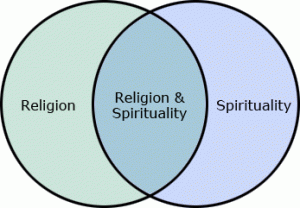Spiritual But Not Religious: A Humanist Perspective

By Chaplain Binyamin Biber
Many people who are leaving religious affiliations, of their families of origin or altogether, often describe themselves as “spiritual, but not religious.” Such a transition is often a lengthy process, rather than a single rapid set of events.
The philosopher George Santayana was perhaps the first to register this phenomenon in contrasting “spirituality” and “piety,” the former relating to exploration, innovation, and risk-taking, while the latter links to fearful guarding, convention, and submissiveness.
Several books by contemporary atheist authors explore this further: The Little Book of Atheist Spirituality by A. Comte-Sponville; Spiritual Atheism by Steve Antinoff; Spirituality for the Skeptic by Robert Solomon; Humanism: Beliefs & Practices by Jeaneane Fowler; Spirituality and the Secular Quest edited by Peter Van Ness; & Secular Wholeness by David Cortesi.
These works address a range of concerns such as the human search for and creation of meaning in our lives; the quality of the interior experience of human beings vs prioritizing more quantitative, acquisitive, status-oriented, and external assessments of human beings and the worth of their lives; deepest motivations that define and direct our lives; and narrative and mythic structures that connect and contextualize human beings among one another and in the world.
So while the phrase “spiritual, but not religious” is often vague and begs more questions than it begins to answer, it also indicates among many of its users a move away from religions and their authoritarian and restrictive aspects, and toward the kind of exploration, innovation, and risk-taking that Santayana analyzed.
Humanists, philosophical naturalists, and nontheists may sometimes find frustrating the use of the phrase and the vagueness and confusion that it often expresses. However, we would do well to empathize with and assist those who are leaving religions and searching for connections, community, and senses of purpose and meaning that they might well find among us if we are gracious enough to be inviting and welcoming, rather than judgmental and dismissive.
I personally think it particularly critical to consider why human beings do the most important things in their lives. What motivates our greatest acts of love and justice? What brings forth and cultivates our creativity, good humor, and compassion? What empowers us to struggle for freedom or to explore the farthest reaches of what is or may yet come to be?
I see in naturalistic (vs supernaturalistic) approaches to “spirituality” discourses of inspiration, exploration, elevation, connectedness, expansiveness, fulfillment, self-actualization of human potential, love beyond simple drives, enlightenment, progress, and the horizons of the imagination. Surely, we can and must accept some amount of muddling toward clarification as we engage in such significant matters.
Chaplain Binyamin Biber founded the Humanist Chaplaincy at American University in 2011. He is an ordained Humanistic Rabbi who has for a decade served Machar, the Washington DC-based congregation for Secular Humanistic Judaism. He is president of the Association of Humanistic Rabbis in North America and a board member of the Humanist Society, the professional organization of chaplains and celebrants of the American Humanist Association.
